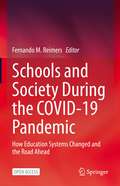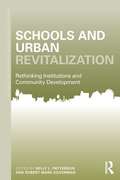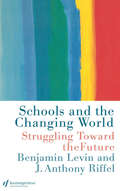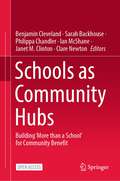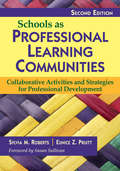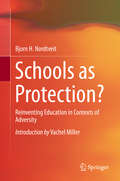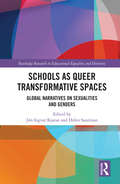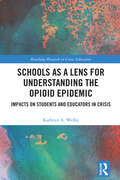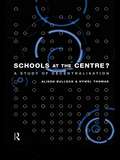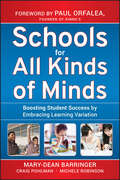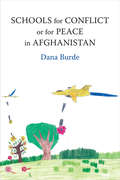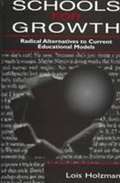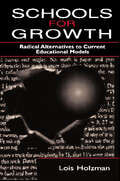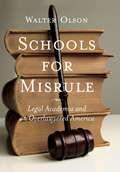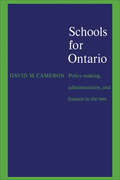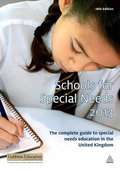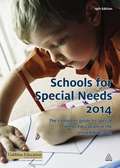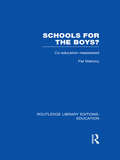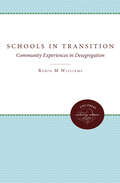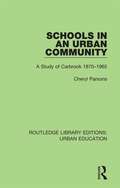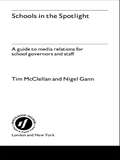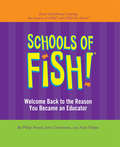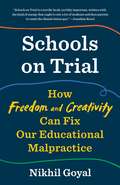- Table View
- List View
Schools and Society During the COVID-19 Pandemic: How Education Systems Changed and the Road Ahead
by Fernando M. ReimersThis open access book provides an analysis of the effects of the COVID-19 Pandemic on diverse education systems, and of the results of the policies adopted to sustain educational opportunities. Through a series of diverse national case studies, the book examines the preexisting fragilities and vulnerabilities in educational structures which shaped the nature of the varied responses, around the world, to teaching and learning during the worst crisis in public education in recent history.The chapters in the book take stock of how educational opportunities changed in various education systems around the world as a result of the Covid-19 pandemic, answering the question of what did education systems, and societies, learn about education as a result of the pandemic.The book covers diverse education systems, with varying levels of resources and facing distinct education challenges, including Brazil, Chile, Finland, Japan, Mexico, Norway, Portugal, Russia, Singapore, Spain, South Africa, and the United States.
Schools and Urban Revitalization: Rethinking Institutions and Community Development (Community Development Research and Practice Series)
by Robert Mark Silverman Kelly L. PattersonNew research in community development shows that institutions matter. Where the private sector disinvests from the inner city, public and nonprofit institutions step in and provide engines to economic revitalization and promote greater equity in society. Schools and Urban Revitalization collects emerging research in this field, with special interest in new school-neighborhood partnerships that lead today’s most vibrant policy responses to urban blight.
Schools and the Changing World
by Benjamin Levin Anthony RiffelSuggestions are constantly being made, both in the popular media and academic literature, about the kinds of changes schools should make. The research in this text shows that schools are primarily inward-looking organizations, and would benefit from better ways of understanding the changes surrounding them and the pressures on them. This text offers theoretical discussion of the ideas around the topic and a set of suggestions for thinking about them.
Schools as Community Hubs: Building ‘More than a School’ for Community Benefit
by Benjamin Cleveland Ian McShane Sarah Backhouse Philippa Chandler Janet M. Clinton Clare NewtonThis open access book brings together research on the planning, design, governance and management of schools as community hubs—places that support the development of better-connected, more highly integrated, and more resilient communities with education at the centre. It explores opportunities and difficulties associated with bringing schools and communities closer together, with a focus on the facilities needed to accommodate shared experiences that generate social capital and deliver reciprocal benefits.This book discusses the expanded roles of schools, and investigates how schools may offer more to their communities—historically, currently and into the future—with respect to the role of the built environment in situating community activities and services.Organised around four sections, it showcases important areas of development in the field via an interdisciplinary approach, which weaves together empirical research with theoretical insights and practical examples. This book not only highlights the challenges associated with the development of schools as community hubs but offers evidence-based insights into how to overcome such hurdles to develop community-facing schools into the future.
Schools as Professional Learning Communities: Collaborative Activities and Strategies for Professional Development
by Dr Sylvia M. Roberts Dr Eunice Z. PruittBuild a community in your school and improve learning outcomes with this one-stop sourcebook that features the latest educational issues, new research-based strategies and activities, and more!
Schools as Professional Learning Communities: Collaborative Activities and Strategies for Professional Development
by Dr Sylvia M. Roberts Dr Eunice Z. PruittBuild a community in your school and improve learning outcomes with this one-stop sourcebook that features the latest educational issues, new research-based strategies and activities, and more!
Schools as Protection?
by Bjorn H. NordtveitIn 1900 the Swedish social theorist Ellen Key launched the idea of a Century of the Child. Recent media reports, from shooting and racial violence in the US to the latest news from ISIS-dominated areas provide a darker vision: it is certainly not a time for children; it is a time during which children's wellbeing is being the cause of worry. This book is about schools and protection of children, and proposes ways to ensure the minimum standards of safety in schools. The issue of protection is not only important in specific conflict settings, but also more and more in mainstream schools in the Western context. Therefore the book is not focusing on a specific geographic area, but analyzing various contexts of adversity, including those affected by poverty, high incidence of HIV/AIDS, as well as conflict and post conflict-affected areas. It also illustrates the effects of such contexts: * non-enrollment of children or early dropout from school; * various forms of abuse and bullying at home and school; * increased incidence of child marria≥ * abusive child labor, and in some cases, the worst forms of child labor. The school emerges as an institution that could play a stronger role in protection of children and that also could provide better support in the transition from childhood to work and marriage.
Schools as Queer Transformative Spaces: Global Narratives on Sexualities and Gender (Routledge Research in Educational Equality and Diversity)
by Helen Sauntson Jon Ingvar KjaranThis book explores the narratives and experiences of LGBTQ+ and gender non-conforming students around the world. Much previous research has focused on homophobic/transphobic bullying and the negative consequences of expressing non-heterosexual and non-gender-conforming identities in school environments. To date, less attention has been paid to what may help LGBTQ+ students to experience school more positively, and relatively little has been done to compare research across the global contexts. This book addresses these research gaps by bringing together ongoing research from countries including Brazil, China, South Africa, the UK and many more. Each chapter examines results of empirical research into school experiences of LGBTQ+ students, and the experiences and perspectives of teachers and parents. All contributions are theoretically informed by aspects of queer theory and/or critical feminist theory, with additional insights from psychological, sociological and linguistic perspectives. Contributing chapters consider how educational workers may question socially sanctioned concepts of normality in relation to gender and sexuality in ways that benefit all students, and how they can ‘queer’ schools to make them less oppressive in terms of gender and sexuality. Expertly written and researched, this book is an invaluable resource for researchers, policymakers and students in the fields of education, sociology, gender studies and anyone with an interest in gender and sexuality studies.
Schools as a Lens for Understanding the Opioid Epidemic: Impacts on Students and Educators in Crisis (Routledge Research in Crises Education)
by Kathryn A. WelbyThis book investigates the profound and complex impact of the opioid epidemic on schools in the United States, focusing on diverse aspects such as its history, legislative responses, trends, and implications for students, educators, and schools.Sharing research from multiple case studies in elementary schools located in Northeast opioid-crisis regions, the book explores the ripple effects of students' adverse childhood experiences, community and household opioid exposure, transiency, homelessness, attendance, as well as the profound struggles of educators dealing with secondary trauma. Shedding light on the untold stories of young children contending with the consequences of opioid exposure, it foregrounds these voices and stories through the unique perspectives of educators. Additionally, the book examines the developing landscape of initiatives to mitigate the crises' effects on students, emphasizing the need for comprehensive approaches. Finally, the book explores potential interventions and strategies to address the complex issues arising from the opioid epidemic in schools, advocating for a comprehensive, multi-tiered approach involving collaboration among various stakeholders.Through a synthesis of historical context, multiple case studies, qualitative follow-up investigations, and analysis, this book provides a comprehensive understanding of the interconnected challenges posed by the overwhelming impact of the opioid epidemic on education in the United States. It will appeal to scholars, researchers, educational leaders, school administrators, teachers, and post-graduate students with interests in crises education, educational psychology, trauma studies, public health policy, sociology of education, and addiction and substance abuse.
Schools at the Centre: A Study Of Decentralisation
by Hywel Thomas Alison BullockFirst Published in 2004. Routledge is an imprint of Taylor & Francis, an informa company.
Schools for All Kinds of Minds
by Barringer Mary-Dean Craig Pohlman Michele RobinsonThis book shows how schools can--and must--develop expertise in "learning variation" (understanding how different kinds of minds learn) and apply this knowledge to classroom instruction in order to address the chronic learning challenges and achievement gap faced by millions of students. Barringer shows how using what we know about learning variation with a focus on discovering learning strengths, not just deficits, can help schools create plans for success for those students who often find it elusive. The book specifically addresses how school leaders can incorporate this knowledge into instructional practice and school-level policy through various professional development strategies. Schools for All Kinds of Minds: Provides a readable synthesis of the latest research from neuroscience, cognitive science, and child and adolescent development as it relates to understanding learning and its many variations. Links this information to strategies for understanding struggling learners and adapting school practices to accommodate a wider array of learning differences in a classroom. Demonstrates how this understanding of learning variation can change the way teachers and others help students succeed in various academic and content areas and acquire necessary 21st century skills. Includes discussion questions and facilitator guidelines for staff developers and teacher education programs; downloadable forms that accompany exercises from within the book; an action plan for schools to implement the ideas found in the book; and more.
Schools for Conflict or for Peace in Afghanistan
by Dana BurdeForeign-backed funding for education does not always stabilize a country and enhance its statebuilding efforts. Dana Burde shows how aid to education in Afghanistan bolstered conflict both deliberately in the 1980s through violence-infused, anti-Soviet curricula and inadvertently in the 2000s through misguided stabilization programs. She also reveals how dominant humanitarian models that determine what counts as appropriate aid have limited attention and resources toward education, in some cases fueling programs that undermine their goals.For education to promote peace in Afghanistan, Burde argues we must expand equal access to quality community-based education and support programs that increase girls' and boys' attendance at school. Referring to a recent U.S. effort that has produced strong results in these areas, Burde commends the program's efficient administration and good quality, and its neutral curriculum, which can reduce conflict and build peace in lasting ways. Drawing on up-to-date research on humanitarian education work amid conflict zones around the world and incorporating insights gleaned from eight years of fieldwork in Afghanistan and Pakistan, Burde thoroughly recalculates and fundamentally improves a popular formula for peace.
Schools for Conflict or for Peace in Afghanistan
by Dana BurdeForeign-backed funding for education does not always stabilize a country and enhance its statebuilding efforts. Dana Burde shows how aid to education in Afghanistan bolstered conflict both deliberately in the 1980s through violence-infused, anti-Soviet curricula and inadvertently in the 2000s through misguided stabilization programs. She also reveals how dominant humanitarian models that determine what counts as appropriate aid have limited attention and resources toward education, in some cases fueling programs that undermine their goals.For education to promote peace in Afghanistan, Burde argues we must expand equal access to quality community-based education and support programs that increase girls' and boys' attendance at school. Referring to a recent U.S. effort that has produced strong results in these areas, Burde commends the program's efficient administration and good quality, and its neutral curriculum, which can reduce conflict and build peace in lasting ways. Drawing on up-to-date research on humanitarian education work amid conflict zones around the world and incorporating insights gleaned from extensive fieldwork in Afghanistan and Pakistan, Burde recalculates and improves a popular formula for peace.
Schools for Growth
by Lois HolzmanPresenting radical alternatives to current educational models. The author of this book donated an original digital copy for inclusion on Bookshare.org. Please join us in thanking Lois Holzman and the Eastside Institute for providing this accessible digital book to this community.
Schools for Growth: Radical Alternatives To Current Education Models
by Lois HolzmanA passionate deconstruction and reconstruction of learning, development, and schooling that urges teachers to explore and create new educational opportunities for themselves and their students, Schools for Growth: Radical Alternatives to Current Educational Models asks the following questions: Can we create ways for people to learn the kinds of things that are necessary for functional adaptation without stifling their capacity to continuously create their growth? Can schools become environments that support children to perform not only as learners but as developers of their lives? This book challenges educators to look at the deeply-rooted assumptions about schooling, learning, and development and urges that the way psychology and education have constructed our conceptions of what it means to teach, to learn, and to grow may be the most serious impediment to the learning and developing of children. Beyond the criticism, the author presents an original methodological reformation of what learning and development are as relational activities and then takes readers on a visit to three radical independent school settings. Arguing that current educational models have been misguided by scientific psychology, the author states that the dominant model of human development actually hinders development. Moreover, as learning theory has become infused with developmental theory over the past 30 years, the overly cognitive manner in which psychologists have come to think about thinking, learning, and development has become further insinuated into education. Both theories--learning and developmental--fail o recognize the human capacity for relational-revolutionary activity and for performance. The prevalent mode of education--acquisitional learning--is grounded in a world view that gives primacy to knowledge and knowing which Holzman believes is inconsistent with ongoing developmental activity. The author focuses on "developmental learning"--a social constructionist, activity-theoretic conception of development which includes a transformation and synthesis of Vygotsky and philosopher Ludwig Wittgenstein. She also discusses educational projects that are self-conscious attempts to break with key elements of modern epistemology and the dominant psychological paradigm as they are perpetrated in contemporary educational theory and practice. Their specific philosophies and practices highlight important methodological issues raised in the attempt to create "postmodern schools"--schools more concerned with growing than knowing.
Schools for Misrule
by Walter OlsonFrom Barack Obama (Harvard and Chicago) to Bill and Hillary Clinton (Yale), many of our current national leaders emerged from the rarefied air of the nation's top law schools. The ideas taught there in one generation often shape national policy in the next.The trouble is, Walter Olson reveals in Schools for Misrule, our elite law schools keep churning out ideas that are catastrophically bad for America. From class action lawsuits that promote the right to sue anyone over anything, to court orders mandating the mass release of prison inmates; from the movement for slavery reparations, to court takeovers of school funding-all of these appalling ideas were hatched in legal academia. And the worst is yet to come. A fast-rising movement in law schools demands that sovereignty over U.S. legal disputes be handed over to international law and transnational courts.It is not by coincidence, Olson argues, that these bad ideas all tend to confer more power on the law schools' own graduates. In the overlawyered society that results, they are the ones who become the real rulers.
Schools for Ontario: Policy-making, Administration, and Finance in the 1960s
by David CameronThe governing and financing of public education is everywhere a complex undertaking. The 1960s was for Ontario a vital decade in education, when the structure of local school boards, provincial and federal financing and control, the provision of academic and vocational systems, and the Department of Education itself were all reconsidered and changed to attain greater efficiency and opportunity throughout the province. This is a detailed case study in intergovernmental relations focusing on provincial-local relations in education. It offers a perceptive insight into the nature of the political system in Ontario by presenting a clear and straightforward analysis of the formulation, content, and impact of provincial policy upon the provision of public education by local school boards. The text is divided into five parts. The first part is an analysis of the provincial-local context within which the policies of the provincial government were developed. The second deals with the Ontario Foundation Tax Plan, a programme of grants from the province to the school boards. Part III is an analysis of two policies developed in a federal-provincial context: capital grants for the construction of vocational schools and the Ontario Education Capital Aid Corporation. Part IV examines three policies affecting the structure of educational government in Ontario: the consolidation of school districts in 1965, the reorganization of the Department of Education, and the further consolidation of school districts in 1969 into county units. In knitting together the highlights of the study, Part V pays special attention to the complex but revealing interrelationship between problems, policies, and the intergovernmental political system of Ontario, and shows how problems were resolved, ameliorated, or even exaggerated by the combined effect of the provincial and federal-provincial programmes. The focus then shifts to the years 1969 and 1970 to demonstrate the changed nature of provincial policy emerging from within an apparently changed context of provincial-local relations. Throughout the study the author`s detailed knowledge and thorough understanding of the policies and processes of the educational system are evident. He presents a mine of statistical information combined with a remarkably keen and concise analysis of the administrative process. This study will be of great interest to educators, administrators, and students of intergovernmental relations.
Schools for Special Needs 2012-2013
by GabbitasSpecial needs provision continues to be the focus of much attention. Growing emphasis on the importance of meeting individual and often highly complex needs means that finding the right school for a child can be a complicated process. Schools for Special Needs explains the full system of special needs education in the UK, and offers parents and carers a comprehensive range of information and advice on key areas of concern, along with the details of more than 2,000 establishments. The book provides commentary from experts in all sectors of special education, and includes: advice on assessment and identification of needs, statementing and school choice; the role of the local authority; the Special Educational Needs Codes of Practice; guidance on further and higher education; and indexes listing schools according to type of need.
Schools for Special Needs 2014
by GabbitasSpecial needs provision continues to be the focus of much attention. A growing emphasis on the importance of meeting individual and often complex needs means that finding the right school for your child can be a complicated process. Schools for Special Needs is an indispensable aid for anyone investigating the legal and practical aspects of SEN provision for children and young people at all stages of education. This fully updated guide covers: assessment and identification of needs, statementing, suitable provision and school choice; all special needs from ADHD and Autism to Speech and Language Difficulty and Visual Impairment; where to seek help, parents' rights and the role of the local authority; the Special Educational Needs Code of Practice; directories of independent and non-maintained special schools, colleges and support services; state-maintained special schools, and mainstream independent schools with specialist provision.
Schools for the Boys?: Co-education reassessed (Routledge Library Editions: Education)
by Pat MahonyDo girls do better in single-sex or co-educational schools? Up to now, discussion has centred on girls’ academic achievements in single or mixed-sex groups, but Pat Mahony’s research clearly demonstrates that this is not the only issue, and that co-education is damaging for girls socially as well as academically. She challenges the argument that co-education is desirable because it is more normal. Her research reveals that it is normal for girls to be ‘put down’ in class, to be verbally abused and sexually harassed by boys, and yes, this will be their ‘normal’ experience as women. But does this justify the way girls are treated in schools? Pat Mahony goes on to explore some of the reasons behind this state of affairs and suggests that the answer lies in sexual politics, not biology. The book concludes with practical suggestions for bringing about change in schools, including case-studies from existing projects.
Schools in Transition: Community Experiences in Desegregation
by Robin M. Williams Jr. Margaret W. RyanThis volume is of great practical value for it is a series of case studies of communities that have made the change-over from biracial public schools to integrated systems. The experience of these communities offers the best available guide to the solution of problems that will face southern communities.Originally published in 1954.A UNC Press Enduring Edition -- UNC Press Enduring Editions use the latest in digital technology to make available again books from our distinguished backlist that were previously out of print. These editions are published unaltered from the original, and are presented in affordable paperback formats, bringing readers both historical and cultural value.
Schools in an Urban Community: A Study of Carbrook 1870-1965 (Routledge Library Editions: Urban Education #2)
by Cheryl ParsonsOriginally published in 1978, Schools in an Urban Community is an ethnography of the Carbrook and Hill Top area of the Attercliffe district of Sheffield before it was cleared for redevelopment. The book provides an in depth look at the community and schools of the area and provides a valued contribution to the field of social history. Using interviews with former pupils, log books and questionnaires from the local community, the book provides a valuable resource for educationists and urban historians, as well as providing a detailed examination of the relations between school and community.
Schools in the Spotlight: A Guide to Media Relations for School Governors and Staff
by Nigel Gann Mr Nigel Gann Tim McClellan Tim McclellanWhat role does a school play in a community and society?This book examines the need for educational establishments to review their position in the local community and to develop strategies to deal with the management of their image. Increasing parental choice means that schools must begin to adopt marketing concepts and tell people what is happening both inside and outside the classroom.Techniques to generate, revisit and challenge a school's ethos are discussed together with ways of getting this message across to the wider community. Effective management of a school's image through judicious handling of the media can lead to better results, higher self-esteem for staff and pupils and a greater recognition of a school's contribution to a local community.This book gives practical guidance on how to identify potential news items and how to convince local newspapers, television and radio organisations to use the story. The book contains many examples of how schools have put comprehensive framework to effective media communication and how to avoid potential pitfalls.
Schools of Fish!
by John Christensen Philip Strand Andy HalperIt's two minutes to 8:00. Time to put on your tights and cape. As an educator, every time that bell rings, you face dozens of challenges. Students with overwhelming personal and academic needs. Creativity-stifling mandates. Administrivia. Cynicism. Apathy. The things that keep you from being the educator you want to be. The FISH! Philosophy--four simple principles: Be There, Play, Make Their Day, and Choose Your Attitude--has helped educators around the world build more effective, fulfilling relationships that lead to better learning. It is also backed by tons (OK, about a hundred pounds) of research on classroom management. Schools of FISH! is full of inspiring and instructive stories about people just like you--with hopes and challenges just like yours. It's about real-life heroes who give the best in themselves to help their students find the best in themselves. Schools of FISH! offers practical ideas on classroom management. It addresses the issues you deal with every day--improving learning, respect and personal accountability, self-discipline and internal motivation, and finding ways to make learning more fun. Because you're not just teaching students to learn . . . you're inspiring them to want to learn.
Schools on Trial
by Nikhil GoyalAn all-in attack on the American way of education and a hopeful blueprint for change by one of the most passionate and certainly youngest (twenty) writers of this subject. Are America's schools little more than cinder-block gulags that spawn vicious cliques and bullying, negate creativity, and true learning and squelch curiosity in their inmates, um, students? Nikhil Goyal, a journalist and activist all of twenty years old whom the Washington Post has dubbed a "future education secretary" and Forbes has named to its 30 Under 30 list, passionately thinks so, and in this book he offers both a scathing indictment of our teach-to-the-test-while-killing-the-spirit educational assembly line and maps out a path for all of our schools to harness children's natural aptitude for learning by creating an atmosphere conducive to freedom and creativity. He prescribes an inspiring educational future that is thoroughly democratic and experiential, and one that utilizes the entire community as a classroom.From the Hardcover edition.
